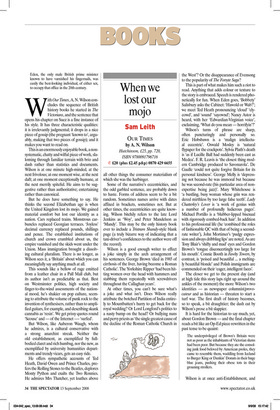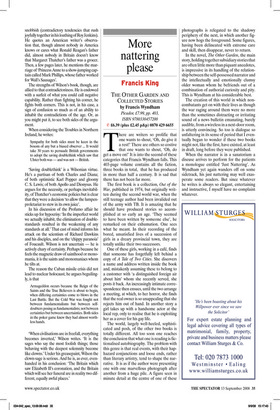When we lost our mojo
Sam Leith
OUR TIMES by A. N. Wilson Hutchinson, £25, pp. 720, ISBN 9780091796716 ✆ £20 (plus £2.45 p&p) 0870 429 6655 With Our Times, A. N. Wilson concludes the sequence of British history books he started in The Victorians, and the sentence that opens his chapter on Suez is a fine instance of his style. It has three characteristic qualities: it is irrelevantly judgmental; it drops in a nice piece of gossip (the pregnant ‘known to’, arguably, making that two pieces of gossip); and it makes you want to read on.
This is an enormously enjoyable book, a nonsystematic, chatty and wilful piece of work, slaloming through familiar terrain with brio and dash rather than statistics and documents. Wilson is at one minute high-minded, at the next frivolous; at one moment wise, at the next daft; at one moment exceptionally humane, at the next merrily spiteful. He aims to be suggestive rather than authoritative; entertaining rather than canonical.
But he does have something to say. He thinks the second Elizabethan age is when the United Kingdom lost its mojo. We gained material comfort but lost our identity as a nation. Cars replaced trains. Monstrous carbuncles replaced Georgian terraces. ‘Joyless’ decimal currency replaced pounds, shillings and pence. The established institutions of church and crown crumbled about us, the empire vanished and the skids went under the Union. Mass immigration brought a dissolving cultural pluralism. There is no longer, as Wilson sees it, a ‘Britain’ about which you can meaningfully say anything much at all.
This sounds like a bellow of rage emitted from a leather chair in a Pall Mall club, but its author isn’t as predictable as that. Best on Westminster politics, high society and finger-to-the-wind assessments of the national mood, he’s shakier on pop culture, seeming to attribute the volume of punk rock to the invention of synthesisers, rather than to amplified guitars, for example, and describing skunk cannabis as ‘resin’. We get prissy quotes round ‘Scouse’ and — of the Internet —‘surfed’.
But Wilson, like Auberon Waugh, whom he admires, is a cultural conservative with a strong anarchist streak. Neither the old establishment, as exemplified by fullbodied claret and rich humbug, nor the new, as exemplified by university humanities departments and trendy vicars, gets an easy ride.
He offers sympathetic accounts of Ted Heath, David Owen and Prince Charles, prefers the Rolling Stones to the Beatles, deplores Monty Python and exalts the Two Ronnies. He admires Mrs Thatcher, yet loathes above all other things the consumer materialism of which she was the harbinger.
Some of the narrative’s eccentricities, and the odd garbled sentence, are probably down to haste. Forms of address seem to be a bit random. Sometimes names arrive with dates affixed in brackets, sometimes not. But at other times, the eccentricities are quite knowing. Wilson bitchily refers to the late Lord Jenkins as ‘Woy’, and Peter Mandelson as ‘Mandy’. This may be the only history book ever to include a Tristram Shandy-style blank page (a truly bizarre way of indicating that a taxi-driver’s confidences to the author were off the record).
Wilson is a good enough writer to effect a joke simply in the arch arrangement of his sentences. George Brown ‘died in 1985 of cirrhosis of the liver, having become a Roman Catholic’. The Yorkshire Ripper ‘had been hitting women over the head with hammers and stabbing them repeatedly with screwdrivers throughout the Callaghan years’.
At other times, you can’t be sure what’s a joke and what isn’t. Does Wilson really attribute the botched Partition of India entirely to Mountbatten’s hurry to get back for the royal wedding? Or Lord Longford’s politics to a nasty bump on the head? Or bullying nuns and pervy priests as ‘the single greatest cause of the decline of the Roman Catholic Church in the West’? Or the disappearance of Evensong to the popularity of The Forsyte Saga?
This is part of what makes him such a riot to read. Anything that adds colour or texture to the story is embraced. Speech is rendered phonetically for fun. When Eden goes, ‘Bobbety’ Salisbury asks the Cabinet: ‘Hawold or Wab?’; we meet Ted Heath pronouncing ‘cloud’ ‘clyeowd’, and ‘sound’ ‘sayownd’; Nancy Astor is heard, with her ‘Edwardian-Virginian voice’, exclaiming, ‘What do you mean — horrifyin’?’ Wilson’s turns of phrase are sharp, often puncturingly and personally so. Eric Hobsbawn is a ‘malign intellectual eccentric’. Oswald Mosley is ‘natural flypaper for the crackpots’. Sylvia Plath’s death is ‘as if Lucille Ball had suddenly been cast as Medea’. F. R. Leavis is ‘the closest thing modern Cambridge produced to Savonarola’. De Gaulle ‘could not quite forgive Britain for its personal kindness’. George Melly is ‘depressing not because he was immoral but because he was second-rate (his particular area of nonexpertise being jazz)’. Mary Whitehouse is ‘a bustling, busy woman whose grin was rendered mirthless by too large false teeth’. Lady Chatterley’s Lover is ‘a work of genius with a number of profoundly ludicrous pages’. Michael Portillo is a ‘blubber-lipped bisexual with rigorously combed-back hair’. In addition to his professional life (he ‘combined the roles of fashionable QC with that of being a secondrate writer’), John Mortimer’s ‘pudgy expression and always dribbling lips’ are noted. As are Tony Blair’s ‘shifty and mad’ eyes and Gordon Brown’s ‘tongue disconcertingly too large for his mouth’. Connie Booth in Fawlty Towers, by contrast, is ‘poised and beautiful ... a meltingly beautiful blonde’ and Polish immigrants are commended on their ‘eager, intelligent faces’.
The closer we get to the present day (and at high tide this story laps right up around the ankles of the moment) the more Wilson’s two identities — as newspaper columnist/provocateur and as historian — threaten to start a turf war. The first draft of history becomes, so to speak, a bit draughtier; the dash cut by Wilson’s prose a bit slappier.
It is hard for the historian to say much, yet, about Gordon Brown — and the final chapter reads a bit like an Op-Ed piece rewritten in the past tense to be quaint:
The underprivileged of Brown’s Britain were not as poor as the inhabitants of Victorian slums had been poor. But because they ate the consoling junk food beloved by American proles, they came to resemble them, waddling from Iceland to Burger King or Dunkin’ Donuts in their huge blue jeans, pushing their obese tots in their groaning strollers.
Wilson is at once anti-Establishment, and snobbish (contradictory tendencies that rush joyfully together in his loathing of Roy Jenkins). He quotes an American writer’s observation that, though almost nobody in America knows or cares what Ronald Reagan’s father did, almost nobody in Britain doesn’t know that Margaret Thatcher’s father was a grocer. Then, a few pages later, he mentions the marriage of ‘Princess Anne to a show-jumping captain called Mark Phillips, whose father worked for Wall’s Sausages’.
The strengths of Wilson’s book, though, are allied to that contradictoriness. He is endowed with a surfeit of what you could call negative capability. Rather than fighting his corner, he fights both corners. This is not, in his case, a sign of confusion so much as of an ability to inhabit the contradictions of the age. Or, as you might put it, to see both sides of the argument.
When considering the Troubles in Northern Ireland, he writes:
Sympathy for both sides must be keen in the bosom of any but a biased observer ... It would take 30 years to persuade British governments to adopt the saving doublethink which saw that Ulster both was — and was not — British.
‘Saving doublethink’ is a Wilsonian virtue. He’s a partisan of both Charles and Diana; of both optimistic Karl Popper and gloomy C. S. Lewis; of both Apollo and Dionysus. He argues for the necessity, or perhaps inevitability, of Thatcher’s economic policies but is clear that they were a decision ‘to allow the lumpenproletariat to stew in its own juice’.
In his discussion of the Profumo affair he sticks up for hypocrisy: ‘In the imperfect world we actually inhabit, the elimination of doublestandards resulted in the weakening of any standards at all.’ That cast of mind informs his attack on the scientism of Richard Dawkins and his disciples, and on the ‘chippy paranoia’ of Foucault. Wilson is not uncertain — he is actively chary of certainty. Perhaps because he feels the magnetic draw of sainthood or monomania, it is the saints and monomaniacs whom he tilts at.
The reason the Cuban missile crisis did not lead to nuclear holocaust, he argues beguilingly, is that
Armageddon occurs because the Reign of the Saints and the True Believers is about to begin, when differing certainties come to blows in the Last Battle. But the Cold War was fought not between fundamentalisms but between selfdoubters posing as fundamentalists; not between certainties but between uncertainties. Both sides in the poker game knew they had almost worthless hands.
‘When civilisations are in freefall, everything becomes inverted,’ Wilson writes. ‘It is the sages who say the most foolish things; those behaving with the deepest solemnity become like clowns.’ Under his greasepaint, Wilson the clown-sage is serious. And he is, as ever, evenhanded in his conclusion: ‘The Britain which saw Elizabeth II’s coronation, and the Britain which will see her funeral are in reality two different, equally awful places.’











































































 Previous page
Previous page